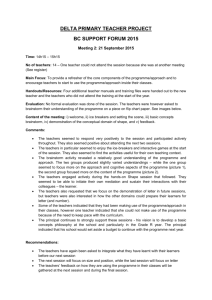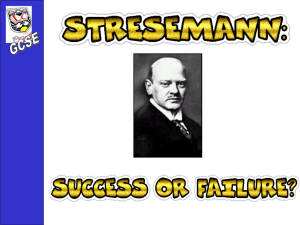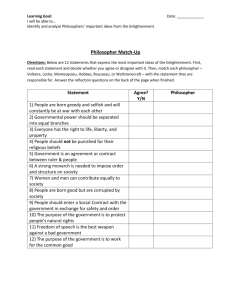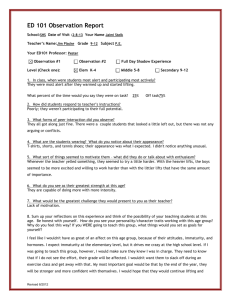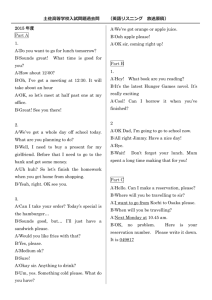doxc here - CLAS Users
advertisement
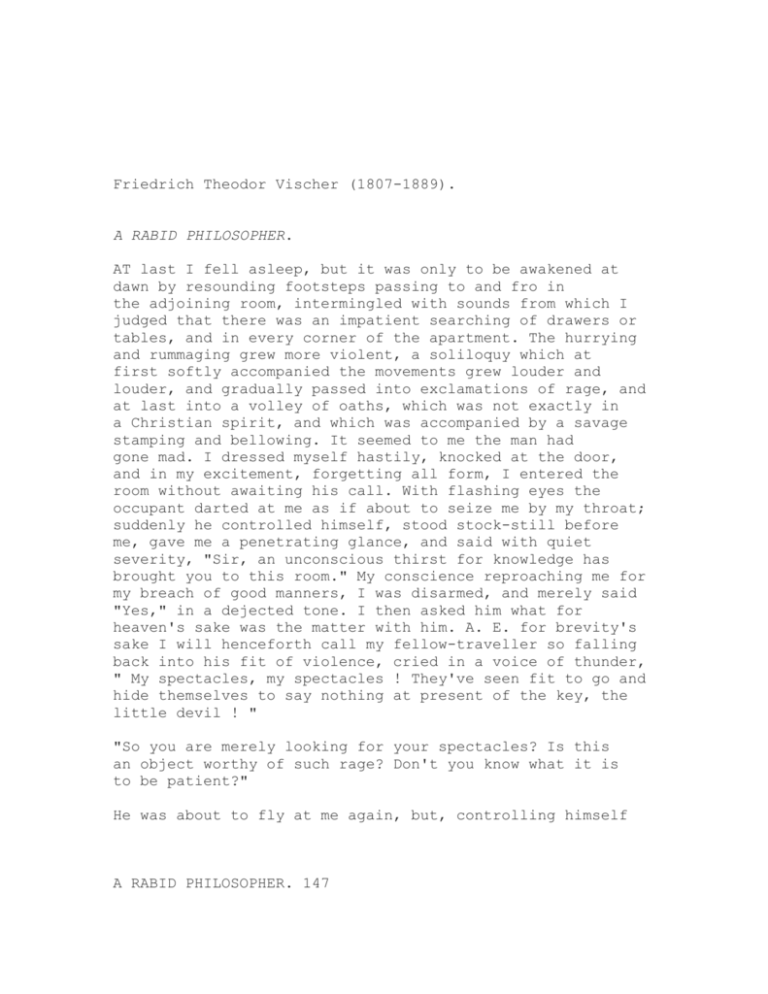
Friedrich Theodor Vischer (1807-1889). A RABID PHILOSOPHER. AT last I fell asleep, but it was only to be awakened at dawn by resounding footsteps passing to and fro in the adjoining room, intermingled with sounds from which I judged that there was an impatient searching of drawers or tables, and in every corner of the apartment. The hurrying and rummaging grew more violent, a soliloquy which at first softly accompanied the movements grew louder and louder, and gradually passed into exclamations of rage, and at last into a volley of oaths, which was not exactly in a Christian spirit, and which was accompanied by a savage stamping and bellowing. It seemed to me the man had gone mad. I dressed myself hastily, knocked at the door, and in my excitement, forgetting all form, I entered the room without awaiting his call. With flashing eyes the occupant darted at me as if about to seize me by my throat; suddenly he controlled himself, stood stock-still before me, gave me a penetrating glance, and said with quiet severity, "Sir, an unconscious thirst for knowledge has brought you to this room." My conscience reproaching me for my breach of good manners, I was disarmed, and merely said "Yes," in a dejected tone. I then asked him what for heaven's sake was the matter with him. A. E. for brevity's sake I will henceforth call my fellow-traveller so falling back into his fit of violence, cried in a voice of thunder, " My spectacles, my spectacles ! They've seen fit to go and hide themselves to say nothing at present of the key, the little devil ! " "So you are merely looking for your spectacles? Is this an object worthy of such rage? Don't you know what it is to be patient?" He was about to fly at me again, but, controlling himself A RABID PHILOSOPHER. 147 once more, he merely looked at me and said : " Screwdrivers ? cork-screws ? " "What do you mean by that?" "I dreamed I had a wife horrible to relate. I laughed at her for reading papers without cutting the leaves, and for putting up for years with a drawer that would not go. Thereupon she gave me a sermon on patience, and required me to exercise myself in that virtue by wearing screws and screw-drivers on my coat instead of buttons and buttonholes, suggesting that they might be quite ornamental if made out of oxidised metal ; or she said I might have corks, which I would be obliged to remove by means of a cork- screw every time I wished to unbutton my coat. Ah, pshaw ! a woman is quite capable of putting a cover upon a dressing-case in such a manner that it will catch every time the upper drawer is opened and shut. Sir, a woman has time for the struggle with the villain called matter ; she lives in this struggle, it is her element ; a man has no business to have time for this, he needs his patience for things that are worthy of patience. It is an imposition to expect him to waste either for what is worthless, an imposition against which he may, can, and must rage ! You must know that. You must know that these unworthy objects, these hooks and crooks of matter, never get entangled with your destiny except when you are in most desperate haste to complete something which is necessary and reasonable ! Miserable gimcrack, worthless button or ball of twine, or string to my eye-glasses that gets twisted about one of the buttons of my vest just at the very moment when it is necessary to look over a timetable in small type at the railway station, I have no time, no time for ye ! And if I were to set a thousand leeches on eternity, they would not draw out a single moment of time for ye!" "But what is the use of all this bluster?" Page 148 "Oil, insipid! Was it of no use to Luther if you are going to talk about use to rail at the devil? Don't you know what it is to disburden your poor soul ? Have you never heard of the precious balm that lies in a good round oath?'' "I TOOK THE EXASPERATED MAN AND POINTED SILENTLY TO THE SPOT." The evil spirit took possession of him anew; he rushed about the room in another paroxysm of rage pouring out a volley of abuse upon his poor innocent spectacles. Mean- A RABID PHILOSOPHER. 149 while I looked about the floor; I picked up a couple of shirts that were clean, but terribly messed, and my eyes fell upon a mouse-hole in the boards. It seemed to me I saw something glitter there ; I looked closer, and the discovery was made. I took the exasperated man by his arm and pointed silently to the spot. He gazed at it, recognised his missing glasses, and remarked : " Look at them well ! Do you notice the sneer, the demoniac triumph in that evil glassy leer ? Out with the entrapped monster ! " It was not easy to pull the spectacles out of the hole ; the trouble was really out of proportion to the value of the object. At last we succeeded ; he held them out at arm'slength, dropped them from there, cried in a solemn voice, " Sentence of death ! Supplicium ! " raised his foot, and crushed them with his heel, shivering them to bits. "That's all very well," I said, after a pause of astonishment;" but now you have no spectacles." "No matter. At any rate this imp has met with a just retribution after years of indescribable malignity. Look you!" He pulled out his watch; it was a very common one in fact, one of the lowest products of the horological industry." In place of this honest, faithful creature," he continued," I once had a gold repeater, which, I may truly say, cost a deal of money. It requited this sacrifice for years and years with untold malice; it never would go right; it made a point of falling down and hiding ; the crystals broke constantly, thereby nearly reducing me to pauperism; at last the monster conspired with the hook of my gold watch-chain, and the two together entered into an intrigue against me. As for the hook, sir, there is much that might be said on that subject. The insidiousness of objects in general I should like to talk to you about that, sir, but I fear I should discourse at some length the insidiousness, I say, is expressed so visibly in the villainous physiognomy of hooks that one cannot be too much on one's guard in having any- PAGE 150 thing to do with these fiendish features. One is apt to think: 'I know you, the wicked crookedness of your outer form betrays you, you shall not get the better of me;' and then this very sense of security misleads one into being unwary. It is quite the reverse with other objects. Who, for instance, would suspect a simple button of any evil design?" I begged him to finish the tragic story about his watch and hook. "Ah, yes! Well, one night the hook crept softly across the small table, upon which I had carefully laid my watch, and artfully entwined itself into the seam of my pillowcase. I did not want the pillow. I lifted it suddenly and flung it to the foot-end of the bed, the watch of course going with it. In a noble arch it went flying through the air, struck the wall, and fell to the ground with a broken crystal. This was the last straw. I crushed it in cold blood like these criminal spectacles; the imp gave forth a sound, a hiss like a per-secuted mouse; I swear to you that it was a sound quite outside the realm of physical nature. I then went and bought this modest timepiece for an absurdly low sum. Look at this faithful creature; note the expression of honesty in these homely features; for twenty years it has served me with steadfast fidelity; yes, I may say it has never given me any cause for complaint. The gold watchchain I gave to my footman, the hook was condemned to die a shameful death in the sewer, and I wear my faithful turnip on this gentle silken cord." During this detailed account he had grown quite tranquil, and now placidly continued "Now for the story of this black hour! Look at this key" he pulled out a small key, probably belonging to his valise" and then at this candlestick!" he held up the metal candlestick upside down close before my eyes, so that I could see a hollow place in the foot "what do you think, what do you suppose, what do you say?" A RABID PHILOSOPHER. 151 "How am I to know?' "For the spare of a good half hour I have looked for that key this morning. I nearly lost my senses; at last I found it, like this, do you see?" He laid the key upon the little stand by his bed, and set the candlestick down upon it; the key just fitted the place under the foot. "Now tell me who would suspect this, who would be capable of such superhuman circumspection as to foresee and avoid such infernal tricks on the part of the object ! And is this what I live for? Am I to waste the precious bit of time I have in such a slavish search for a bagatelle? To search and search, and to search again! One should never say A. or B. has lived for such and such a time, not lived, but searched ! And I am very, very punctual, believe me!" "Ah, yes, life is a perpetual search," I said, with a sigh which might be taken to refer to the trials of life, while in truth it was called forth by the ennui which this detailed occupation with the bagatelle had caused. This accounted for my flat remark, the sole object of which was to change the subject at all hazards. I little knew to whom I was talking. "What, sir, symbolic?" he said. "And I suppose you think that is deeper! Ah, oh!" "Well, what now?" "You see, my dear sir, to search in a symbolical sense, to think that all of life is but a searching, that is not what I complain of, that is not what you should sigh about. The ethical goes without saying. An honest fellow will search and yearn and never complain, but be happy in the midst of this misery of an ever-rising and neverterminating line. That is our upper storey. But what we have to take along with it, the vexation and bother we must put up with in the lower storey of life, that is what I am talking of. There, PAGE 152 for instance, is the necessity of searching, which makes you mad, nervous, insane. And, what is more, it strands you in Atheism. The dear God sitting on high and counting the hairs on our head, who sees me searching for my spectacles for hours at a time, he sees the spectacles too, knows just where they are, can you bear it, the thought of how he must laugh ? A kind, omnipotent Being! Do you think such a one would permit the curse of colds in your head? Alas, we are born to search, to undo knots, to sneeze and cough and spit ! Man, with a proud world within his arched brows, with his beaming eyes, his spirit dipping into the depth and breadth of infinitude, with his soul rising on silver wings into the heavens, with his imagination pouring streams of golden fire over hill and vale and transforming the image of mortality to God, with his will, the flashing sword within his hand to adjust, to judge, to conquer, with pious patience to plant, to cherish, and watch over the tree of life that it may grow and flourish and bear heavenly fruit of noble culture, Man with the angelic image of the divine and beautiful within his longing, yearning bosom, yes, this same Man, changed to a mollusc, his throat a grating-iron, a nest of devils, tickling the larynx with finest needles for nights and nights, his eyes dim, his brain heavy, dull, perturbed, his nerves poisoned, and, with all that, not considered ill; and you say that God!" Here our denier of the existence of God was seized with so deplorable a fit of sneezing and coughing that I repressed a remark I had upon my tongue. Upon entering I noticed that he cast an uneasy glance all about the floor of the dining-hall; he seemed much relieved when in one corner he noticed a small object which may be of service to coughing persons. In a tone of supreme content he remarked, "This room is really very well furnished;" A RABID PHILOSOPER. 153 and from that time he seemed to be in tolerably good humour. As is common at the Swiss hotels, breakfast had been placed upon the table awaiting whoever should come to partake of it, and A. E., having pushed the butter and honey aside with some violence, helped himself freely. We were alone in the room, but soon another tourist entered. He was a middle-aged man, attired in a duster of unbleached linen, with a short cape hanging over his shoulders, and carrying a knapsack of some weight on his back. There were drops of perspiration visible upon his brow; it appeared evident that he had walked for some hours that morning. He laid down his burden, put his bulky umbrella in a corner, sat down at the other end of the table, pulled his chair up, took out his glasses, carefully looked at everything that had been set upon the table, seemed to quite approve of the completeness of things that go to make up an English breakfast, and then, with all the appearance of a soul conscious that the body belonging thereto had severely earned its breakfast, began the enjoyable task of cutting and spreading some slices of bread. It was easy to see that the man belonged to the class of scholars, and his pale complexion led me to judge that he was one of those tourists who strive to make up by pedestrian exertions for the harm they have done their bodies throughout the year by sedentary habits. A. E., who had meanwhile appeased his appetite, seemed to be in no special haste to depart. He lit a cigar, and said to me, "You admit, then, that physics is at bottom synonymous with metaphysics, the science of the spiritual. That is, I take for granted that you admit it, although I have not yet proved it to you philosophically, for you have surely recognised the universal insidiousness, ay, animosity of matter, what physical science has heretofore insipidly named the law of gravity, statics, etc., while it is in truth to be explained merely as demoniacal possession." PAGE 154 Meanwhile the stranger had split a long roll lengthwise with dexterity and precision, and was occupied in spreading on the butter with great regard to perfect smoothness and evenness; he made a moment's pause at the last words, casting a peculiar glance from under his bushy eyebrows over to our end of the table, and then thoughtfully continued his plastic occupation, wagging his head now and then with an expression of ironical surprise. The thought came to me that A. E. had designs upon the stranger. But I concluded that it was not the case. He had given him but a cursory glance as he entered, though it was a glance which might be supposed to grasp the personality before him, for his eye was wont to seize what it looked upon as if there were a strong hand within it; at the same time there was no sign of his paying any attention to the unknown. "Friend," he continued, "have you noticed how a piece of falling paper will mock us? Are they not graceful, the sneering motions with which it flutters back and forth? Does not every turn tell you with elegant, voluptuous nonchalance that you are beaten? Oh, matter lies ever in waiting. I sit down cheerfully after breakfast to begin my work, never suspecting the enemy. I dip in my pen, there's a hair in it; that is the way it begins. The fiend will not come out; I get ink on my fingers, the paper gets stained. I look for another sheet, then for a book, and so on; in short, my blessed morning is gone. From early dawn until late at night, so long as there is a human being about, matter is on the alert to play him a trick. The only way to do is to treat it as the lion-tamer does the beast whose cage he has ventured to enter he meets its gaze and the beast meets his. To talk about the moral power of a human being is all nonsense, a mere fairy-tale; no, the steady gaze only tells the brute that the man is on his guard, and gaze against gaze the monster lurks to see if for one single moment he will forget himself. So lurks all matter, lead- A RABID PHILOSOPHER. 155 pencils, pens, inkstand, paper, cigar, glass, lamp all, all for the moment when you are not watching. But, ye saints! who can ever do it? Who has time? And like the tiger that leaps upon its unfortunate victim the moment he knows himself to be unnoticed, so does matter, drat it! sometimes clumsily, sometimes subtly, as the case may be. Diabolically subtle, for instance, was the bit of iron filing that landed in my eye the morning I was about to start out on my tour. Oh, believe me, when a respectable person is going a-travelling all the devils hold an ecumenical council to defeat him. But one of the favourite tricks dear to the heart of all objects is to creep stealthily to the edge, and drop down from a height to slip out of your hand you forget yourself but a single moment and there goes" At this moment we heard a slight sound at the end where the other man was sitting; we saw him dodge hastily under the table, and then emerge with an object in his hand, which he looked upon in evident distress, and then with deep dejection. It was his roll, spread first with butter and then with honey in the most accurate and approved manner, and, "of course," as A. E. would say, it had fallen upon the buttered side. It was with a great effort that I overcame a strong desire to laugh, for it seemed exactly as if there had been a mystic primordial relation between his words and the disaster. A. E. glanced across the table with perfect gravity, and gently nodded his head without a vestige of irony; nay, rather, with an expression of sympathy, as much as to say: we poor mortals know all about it. The stranger shot not only one but a whole battery of venomous glances over to our side, and sullenly set to work to produce a fit successor to the incurable roll. A. E. continued quietly: "Then too I don't like that business about that thing, or rather the two things, that Kant called the pure form of a priori perception." PAGE 156 "Space and time?" 44 That's it. What is space but an ment by means of which I am forced putting R here" (he illustrated it bottles, which were rather closely and impertinent arrangeto remove A before with cups, dishes, and set upon the table), " "WE SAW HIM EMERGE WITH AN OBJECT IN HIS HAND. to make room for A put C somewhere else, and so on ad infinitum? And time? That is what you never have for anything. For, ye gods and little fishes! is that what we live for to have need of ten motions for things that are not worthy of one ! " A RABID PHILOSOPHER. 157 The stranger now shook his head with more violence, laughing petulantly, and a vague unrest seemed to take possession of his legs. A. E. rambled on. "At other times," he continued, "the reverse action takes place. Things go together that don't belong together. Do you know one of the most pestiferous forms of going along ? When a precious sheet belonging to manuscript A manages to become attached to manuscript B, and slips into the wrong drawer, and declines to be found for days and weeks and years, while you are searching for it in rage and despair and impotent frenzy. Compared to that such a thing as the well-known slipping under your chair of a lady's dress is but a little playful pleasantry on the part of the devil-ridden object, albeit it is interesting as a fact sufficient to defeat our nonsensical science of physics, for who could ever explain such a thing mechanically ? " Here the stranger jumped up with the exclamation, "This is too much!" came upon us with heavy strides, planted himself firmly before A. E., and cried in a voice of thunder, "Sir, I would have you to know that I am a Professor of Physics! And, moreover, you have, so to speak, knocked my roll out of my hand!" A. E. gave the man a long, contemplative look and was silent. Who could tell how this was coming out? Suddenly a crimson flush came into his face, his eyes sparkled, he jumped up, and I, not knowing my man very well as yet, was beginning to fear for the peace, when he with enormous strides, ay, with leaps like a panther, rushed straight across the room towards the corner which held the article before delicately referred to, and now followed a fit of coughing and sneezing intermingled with strange, wild, gurgling sounds, a perfect storm of rasping, rumbling, rattling, snarling, groaning, and barking tones; it was like a chorus of infernal spirits. It took considerable time for this terrific PAGE 158 natural phenomenon to pass over; then the raised his head, seized his hat, bag, and me in a pitiful, broken treble, "Will you to appease the gentleman? Good morning to sufferer feebly cane, and said to have the goodness you both."
